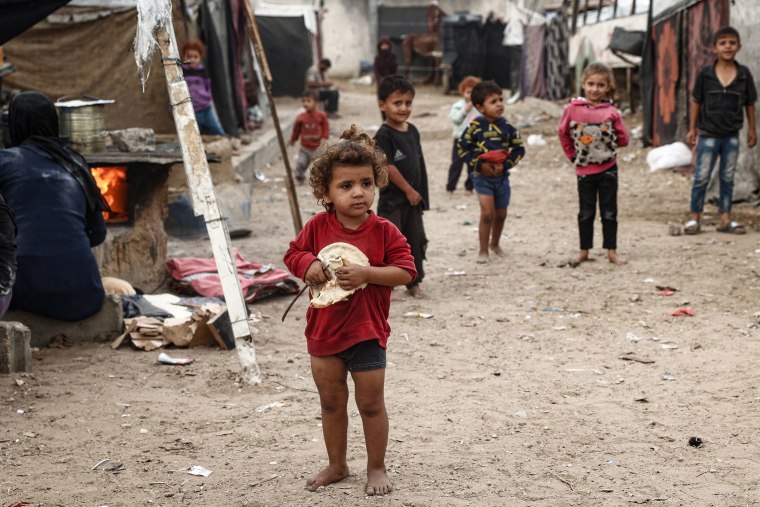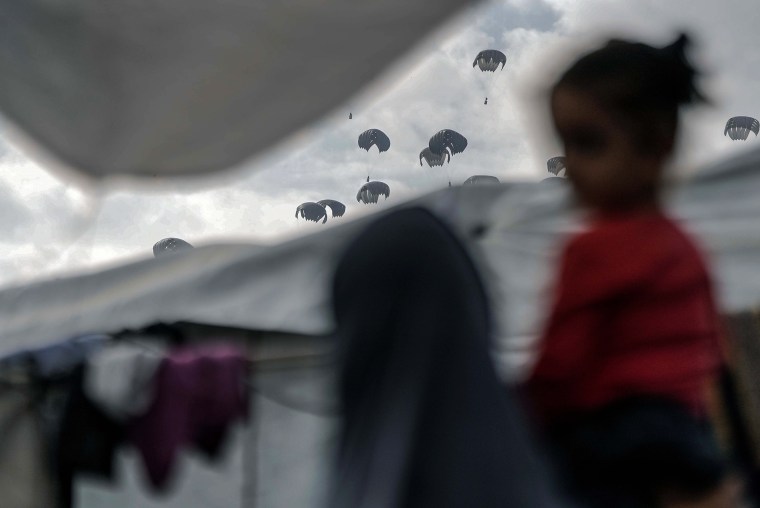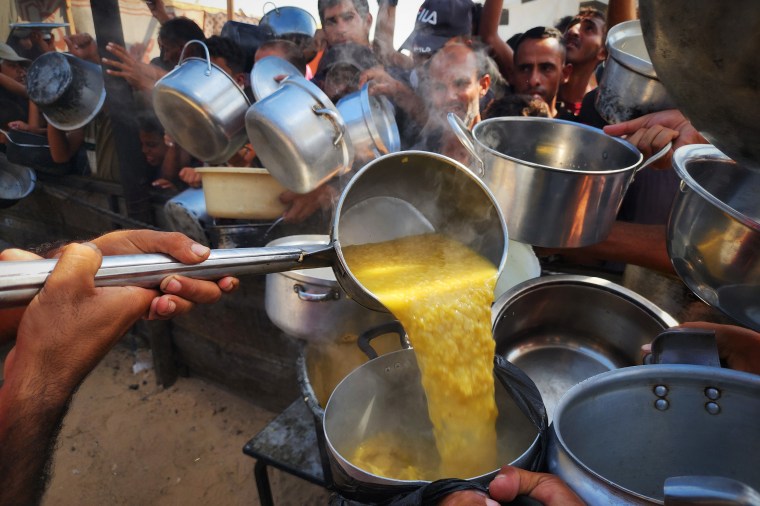More than 40% of people in Gaza will face "catastrophic" levels of hunger in the coming months, a global authority on food security warned Thursday.
The report emerged as Israel came under increasing pressure, including from its most important ally, the U.S., to allow more essential humanitarian aid in.
The Integrated Food Security Phase Classification, which sets a scale the United Nations and governments use to assess hunger, said there will be a persistent risk of famine in Gaza this winter unless more humanitarian aid reaches the Palestinian enclave.
The release said 9 in 10 Gazans — roughly 2 million people — face “acute food insecurity” in the months ahead. Reuters reported that the Israeli government has stopped processing requests from traders to import food to Gaza.
The move blocks a route that for the past six months has been used to supply more than half of the Palestinian territory’s provisions. Reuters spoke to numerous sources who confirmed the cessation: five Gaza-based importers, two businessmen sending goods from the West Bank, a Gaza-based business official and three people involved in aid delivery.
“The situation is getting desperate,” said Ibrahim Baraka, a resident of southern Gaza. “We have some nonperishable aid, but there’s virtually no fresh produce anymore.”

Israeli Prime Minister Benjamin Netanyahu held an emergency meeting Wednesday to discuss increased U.S. pressure to ramp up aid into Gaza and warnings that Washington would be “watching the matter.”
An Israeli official confirmed the meeting to NBC News on Thursday but did not provide further details about the discussion, which was held the day Linda Thomas-Greenfield, the U.S. ambassador to the U.N., issued a stern rebuke to Israel at a meeting of the U.N. Security Council.
Washington had “made clear to the Israeli government at the highest levels that it must do more to address the intolerable and catastrophic humanitarian crisis in Gaza,” she said.
A “quote-unquote ‘policy of starvation’ in northern Gaza would be horrific and unacceptable and would have implications under international law and U.S. law,” she said.
Noting that the Israeli government had said that was “not their policy,” she said the U.S. would be “watching” to ensure that Israel’s actions on the ground matched that assurance.
She spoke after Joyce Msuya, the acting undersecretary-general for humanitarian affairs, said at the meeting that “no food aid” had entered northern Gaza in the 13 days from Oct. 2 to Tuesday.
While the U.N. counts only its own trucks, Israel includes commercial vehicles in its tallies.
“Given the abject conditions and intolerable suffering in north Gaza, the fact that humanitarian access is nearly nonexistent is unconscionable,” Msuya said.
The council met after the U.S. government threatened in an unusually stern letter to review military assistance to the Israel government unless the dire humanitarian situation in the enclave started to improve.
The lengthy letter, dated Sunday, was sent from Secretary of State Antony Blinken and Defense Secretary Lloyd Austin and addressed to Israeli Defense Minister Yoav Gallant and Strategic Affairs Minister Ron Dermer.

According to a version Axios published Tuesday, the letter suggested that the U.S. would restrict weapons sales if the Israeli government did not allow more humanitarian aid into Gaza.
NBC News has not seen an original copy of the letter, which set out steps Israel must take within 30 days, including allowing a minimum of 350 trucks to enter Gaza each day, instituting humanitarian aid pauses in fighting and canceling needless civilian evacuation orders.
The Defense Department could not confirm whether the letter Axios published was the final version sent to the Israeli officials.
Acknowledging that the letter had been sent, Matthew Miller, a State Department spokesperson, said Wednesday that Blinken and Austin “thought it was appropriate to make clear to the government of Israel that there are changes that they need to make again to see that the level of assistance making it into Gaza comes back up from the very, very low levels that it is at today.”
Asked about potential consequences for Israel if it did not comply, Miller said there were “provisions under U.S. law that require us to make certain certifications. And to make those certifications, we have to see that Israel is not arbitrarily denying humanitarian assistance making it into Gaza.”
While Miller did not mention it explicitly, provision 620I of the Foreign Assistance Act prevents the U.S. government from giving military assistance to a country restricting the delivery of humanitarian aid unless it triggers a legal waiver relating to national security interests.

Israel’s U.N. ambassador, Danny Danon, maintained at the Security Council meeting that Israel's humanitarian efforts in Gaza had "remained as comprehensive as ever," despite warnings from the United Nations and the World Food Program countering that claim.
And COGAT, the unit within the Israeli Defense Ministry responsible for civilian policy in Gaza, also announced Wednesday that 50 trucks carrying humanitarian aid, including food, water, medical supplies and shelter equipment provided by Jordan, had been transferred earlier in the day to the northern Gaza Strip “as part of the commitment to deliver humanitarian aid” to the enclave.
People involved in aid distribution in Gaza told NBC News that several trucks had entered Gaza City in the north of the enclave but that aid had not been distributed elsewhere in the north. NBC News has chosen not to name them for security reasons.
Thomas Greenfield also noted at the Security Council meeting that several dozen units of aid had entered northern Gaza "for the first time in several weeks."
"But that's not enough. Many, many more deliveries are needed, and we will continue to push for that," she said.
